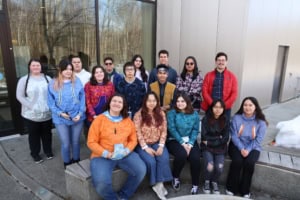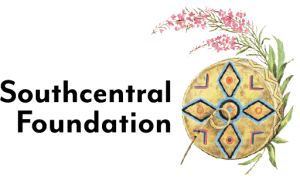Raise Interns Embrace New Cultural Curriculum
By Technical Writer Uinita Mauigoa

Raise interns learn to embrace the rich heritages and cultures of Alaska Native and American Indian people.
There was a time when this land was pristine and inhabited by multiple cultures living in reciprocity and respect alongside each other, the animals, and the elements. Thousands of years have passed, and many of these cultures Indigenous to Alaska are still thriving today.
An important goal for Southcentral Foundation’s Raise Program is to provide Alaska Native and American Indian interns opportunities to develop their identities, connect with their communities, and develop a cultural understanding to carry into their futures.
Raise recently piloted a new work plan, “Alaska Native Culture and History Curriculum Development for Interns,” to youth ages 14 to 19. The aim is to support Alaska Native and American Indian interns in developing awareness and appreciation for their own rich cultures and history while designing and establishing a curriculum based on the state’s cultural standards.
“There is a point in young people’s lives when they ask themselves, ‘Who am I really?’ It is about the authenticity of self,” Raise Youth Advisor Shirley Tuzroyluke shared.
The first lesson of the curriculum, which Tuzroyluke co-created, starts with an overview seen from the Indigenous perspective examining the peoples, cultures, and languages that existed in Alaska for thousands of years. Interns created a timeline that spanned back 14,000 years. With two inches representing every 100 years, interns produced 25 feet of paper illustrating that this land has been populated for centuries.
Tuzroyluke shared that this fall, the program hopes to expand on this introduction to delve into and learn more about the multiple cultures Indigenous to Alaska.
Examining the history of Alaska reveals that Alaska Native people descended from a long line of strong, intelligent, and resilient people. Tuzroyluke recently shared with interns that an archeology site in Tanana River Valley revealed Athabascan people hunted mammoths, a study highlighted by the University of Alaska Fairbanks. Tuzroyluke enjoys seeing the interns’ eyes light up with curiosity.
Cultural awareness and tradition play important roles in youth building self-esteem and developing a positive sense of identity. The Raise Program shares many aspects of culture such as cultural values, ways of knowing and communicating, storytelling, and descendance. Interns have the opportunity to connect with others from varying cultures to learn similarities and differences that weave everyone together.
“We have a responsibility to interns to raise their awareness that they have a very rich and relevant history,” Tuzroyluke shared. “It’s not something that died at the time of contact with European cultures; it is a way of being that is relevant in today’s world.”
The goals of the Raise Program are to introduce Alaska Native and American Indian interns to administrative and health care careers, provide work site experiences, and support educational goals to become the next generation of leaders.
To learn more about the Raise Program, call (907) 729-5015.


